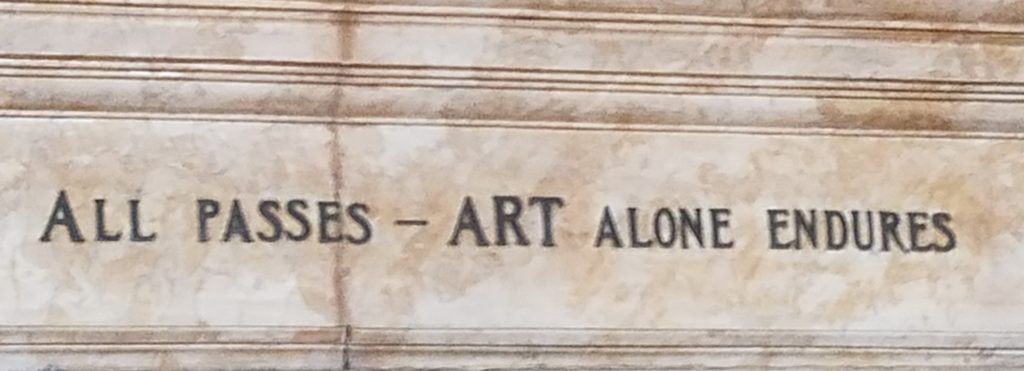“I am a part of all that I have met.” Alfred Lord Tennyson
I had a ballet teacher who would often tell us everyone is good for something, if only to be a bad example. I was never sure what he meant until I, myself, experienced a very bad teacher as an undergrad. I vowed never to be like him because he did not teach, he assigned chapters. I have brought my ballet teacher’s pithy observation with me from the ballet studio to my own classroom and choir room. I hope my teacher’s bad example of what teaching is has helped inform my teaching and conducting for the better.
All of us are influenced by our own former teachers, students, colleagues and acquaintances. We bring those experiences with us; to our work, to our personal life as well as our attitude about certain things. Today’s Choral Ethics will share three such stories.
Michelle* tells me her work ethic comes directly from her father. He worked hard for his family, never taking a day off in her recollection, until his retirement. He told her one of the reasons he tried to never take a day off was he felt he wasn’t important enough and didn’t want his company to realize he wasn’t important. He occasionally brought work home, but not too often, and always was prepared for the next day. He said he would do it all again because he built a good life for his family and feels it was worth it.
As a result of his example, Michelle is rarely absent from her high school choral position and is always prepared. There are days when she would LOVE to take a personal day but chooses not to. She works hard for her family, and feels she and her spouse are building a good life for their own children as well as setting good examples.
Nicole* grew up in a small town with one high school. She was the “star” in all the musicals and got all the solos in the choral concerts. Her friends did NOT get the parts. They made sure she knew they were not pleased, by doing what teenaged girls do. When she went off to college, the only people still speaking to her were the next-door-neighbor and her sister and brother. College was better, since she was among MANY talented students and felt like she belonged. She vowed that if she ever taught high school music, she would spread parts and solos around so no one would feel singled out or slighted.
As you might guess, Nicole is now a high school music and drama teacher in a small town with one high school. She’s been there for five years and has changed their performing arts culture. When she arrived, it was much like her hometown school with a “chosen” talented kid who got all the parts. Nicole felt for That Kid and worried about him. She spoke to him before she changed anything and he begged her to NOT give him the lead role in the spring musical that year. He was only a sophomore and was afraid of his friends’ reactions.
Nicole methodically gives parts to almost everyone who auditions. She gives larger parts to upper classmen and the secondary ones to underclassmen. She is scrupulously fair to anyone who auditions for her. There have been some complaints, mostly from parents whose kids did not get big parts, but NONE from students. And that student who begged not to give him the lead in the spring musical the first year will be her student teacher this spring.
Danielle* loves researching music for her church choir and tries to find the best possible anthem for every lectionary reading. She enjoys discovering music, both old and new, and gets excited when she finds an anthem perfect for her choir’s ability. The real thrill, she tells me, is when she finds an anthem that is particularly geared to her choral forces. When she finds one, she knows her choir will sound good and will love it! It wasn’t always like this for Danielle.
She was new to working with a typical church choir and would choose anthems she liked which fit with the lectionary theme. Those are all good reasons to choose music, but the pieces seemed beyond her choir. Consequentially, her choir didn’t sound good, they didn’t like the piece and she was frustrated with them and herself. Until she attended a summer church music retreat, she almost didn’t attend, and everything changed.
She attended the daily morning seminar meant for those with a smaller choir. Every day, she learned something new to help her situation, including choosing repertoire. On the last day, the person leading the session made a simple statement; use the horses you’ve got, not the ones you don’t. Everything clicked for her from that moment on.
Danielle is grateful she attended that seminar thirty years ago because it changed her life. She directs a much larger choir, at a much larger church but still uses “the horses you have vs. the horses you don’t” approach. It’s served her well.
A parent’s good example, a situation you are determined you won’t repeat and a “light bulb” moment can all have an impact on how we perform in our profession. The people who influence us, for the better or worse are all part of us.
*Name Withheld



Leave a Reply
You must be logged in to post a comment.